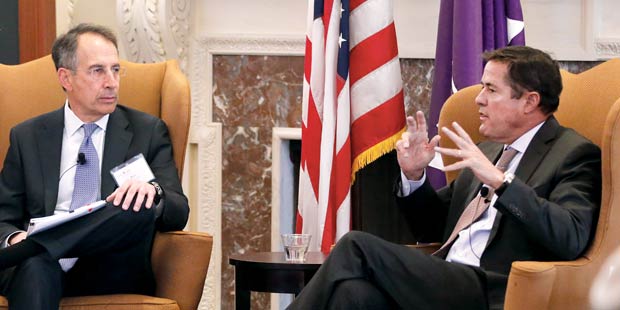Bold Financial Statements
Printer Friendly VersionLast January, the NYU Journal of Law & Business’s annual symposium featured a keynote in the form of a fireside chat between James “Jes” Staley, managing partner of BlueMountain Capital, and Kenneth Raisler ’76, a partner at Sullivan & Cromwell and a Law School trustee. Before joining BlueMountain in 2013, Staley spent 34 years at JPMorgan Chase and its predecessors, running the bank’s equity capital markets group, its private bank, its asset management business, and, lastly, its investment banking division.
Raisler began by asking Staley what he thought were the primary causes of the financial crisis, prompting a refreshing admission: “Before I answer that, let me say that the financial community has a lot to atone for given the financial crisis and the damage it left in its wake.” Staley then offered three specific and detailed causes that have rarely topped more popular lists of culprits: a handful of collective mistakes by bankers, academics, regulators, and investors, including widespread agreement that any securities rated AAA were effectively risk-free and the idea that any country in the newly formed Eurozone posed the same credit risk as any other; regulatory oversight’s failure to keep up with the evolution of financial markets; and Wall Street’s conduct, particularly stemming from perverted incentives and compensation structures.
Staley went on to defend modern financial techniques and the size of financial players such as JPMorgan Chase. “Cars today don’t pollute nearly as much and their fuel efficiency is vastly superior, but we no longer have any idea how they work. That’s the price of complexity…. JPMorgan Chase is not large just because it wants to be. It is large because its clients want it to be large.”
—

